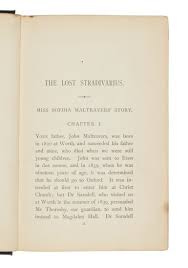“....like a nightmare on the brain of the living.”
The Lost Stradivarius (1895) by J. Meade Falkner
Readers unfamiliar with The Lost Stradivarius may prefer to read these notes only after reading the novel.
The Lost Stradivarius (1895) by J. Meade Falkner is a superb historical horror novel.
It consists of two narrative strands. In the first, an aunt tells her nephew about the tragic ends of his mother and father.
In the second, the late father's lifelong friend gives his account of the same events, from school years to diabolical extirpation.
Action moves from Magdalen Hall, Oxford to various country houses. Italy and the culmination of family tragedy concludes the itinerary. A postlude, allowing a clarification of the plot, finishes the horrors inflicted on its two wealthy and respected families.
Falkner's style in The Lost Stradivarius looks forward to horror fiction's aesthetic high-water era: E. F. Benson, Elizabeth Bowen, H. Russell Wakefield, and ultimately Gerald Kersh, Robert Aickman, and Simon Raven.
As the evening advanced he became very uneasy, and rose more than once from his bed. This restlessness, following on the repose of the day, ought perhaps to have made me anxious, for I have since observed that when death is very near an apprehensive unrest often sets in both with men and animals. It seems as if they dreaded to resign themselves to sleep, lest as they slumber the last enemy should seize them unawares. They try to fling off the bedclothes, they sometimes must leave their beds and walk. So it was with poor John Maltravers on his last Christmas Eve. I had sat with him grieving for his disquiet until he seemed to grow more tranquil, and at length fell asleep. I was sleeping that night in his room instead of Parnham, and tired with sitting up through the previous night, I flung myself, dressed as I was, upon the bed. I had scarcely dozed off, I think, before the sound of his violin awoke me. I found he had risen from his bed, had taken his favourite instrument, and was playing in his sleep. The air was the Gagliarda of the "Areopagita" suite, which I had not heard since we had played it last together at Oxford, and it brought back with it a crowd of far-off memories and infinite regrets. I cursed the sleepiness which had overcome me at my watchman's post, and allowed Sir John to play once more that melody which had always been fraught with such evil for him; and I was about to wake him gently when he was startled from sleep by a strange accident. As I walked towards him the violin seemed entirely to collapse in his hands, and, as a matter of fact, the belly then gave way and broke under the strain of the strings. As the strings slackened, the last note became an unearthly discord. If I were superstitious I should say that some evil spirit then went out of the violin, and broke in his parting throes the wooden tabernacle which had so long sheltered him. It was the last time the instrument was ever used, and that hideous chord was the last that Maltravers ever played.
I had feared that the shock of waking thus suddenly from sleep would have a very prejudicial effect upon the sleep-walker, but this seemed not to be the case. I persuaded him to go back at once to bed, and in a few minutes he fell asleep again. In the morning he seemed for the first time distinctly better; there was indeed something of his old self in his manner. It seemed as though the breaking of the violin had been an actual relief to him; and I believe that on that Christmas morning his better instincts woke, and that his old religious training and the associations of his boyhood then made their last appeal. I was pleased at such a change, however temporary it might prove. He wished to go to church, and I determined that again I would subdue my curiosity and defer the questions I was burning to put till after our return from the morning service. Miss Maltravers had gone indoors to make some preparation, Sir John was in his wheel-chair on the terrace, and I was sitting by him in the sun. For a few moments he appeared immersed in silent thought, and then bent over towards me till his head was close to mine, and said, "Dear William, there is something I must tell you. I feel I cannot even go to church till I have told you all." His manner shocked me beyond expression. I knew that he was going to tell me the secret of the lost pages, but instead of wishing any longer to have my curiosity satisfied, I felt a horrible dread of what he might say next. He took my hand in his and held it tightly, as a man who was about to undergo severe physical pain and sought the consolation of a friend's support. Then he went on—"You will be shocked at what I am going to tell you; but listen, and do not give me up: You must stand by me and comfort me and help me to turn again." He paused for a moment and continued—"It was one night in October, when Constance and I were at Naples. I took that violin and went by myself to the ruined villa on the Scoglio di Venere." He had been speaking with difficulty. His hand clutched mine convulsively, but still I felt it trembling, and I could see the moisture standing thick on his forehead. At this point the effort seemed too much for him and he broke off. "I cannot go on, I cannot tell you, but you can read it for yourself. In that diary which I gave you there are some pages missing." The suspense was becoming intolerable to me, and I broke in, "Yes, yes, I know; you cut them out. Tell me where they are," He went on—"Yes, I cut them out lest they should possibly fall into anyone's hands unaware. But before you read them you must swear, as you hope for salvation, that you will never try to do what is written in them. Swear this to me now, or I never can let you see them." My eagerness was too great to stop now to discuss trifles, and to humour him I swore as desired. He had been speaking with a continual increasing effort; he cast a hurried and fearful glance round as though he expected to see someone listening, and it was almost in a whisper that he went on, "You will find them in—" His agitation had become most painful to watch, and as he spoke the last words a convulsion passed over his face, and speech failing him, he sank back on his pillow. A strange fear took hold of me. For a moment I thought there were others on the terrace beside myself, and turned round expecting to see Miss Maltravers returned; but we were still alone. I even fancied that just as Sir John spoke his last words I felt something brush swiftly by me. He put up his hands, beating the air with a most painful gesture, as though he were trying to keep off an antagonist who had gripped him by the throat, and made a final struggle to speak. But the spasm was too strong for him; a dreadful stillness followed, and he was gone....
.... I must confess that I should have felt the discovery of these pages as a relief; for though I dreaded what I might have had to read, yet I was more anxious lest, being found at a later period and falling into other hands, they should cause a recrudescence of that plague which had blighted Sir John's life....
Medieval philosophers and theologians held that evil is in its essence so horrible that the human mind, if it could realise it, must perish at its contemplation. Such realisation was by mercy ordinarily withheld, but its possibility was hinted in the legend of the Visio malefica. The Visio Beatifica was, as is well known, that vision of the Deity or realisation of the perfect Good which was to form the happiness of heaven, and the reward of the sanctified in the next world. Tradition says that this vision was accorded also to some specially elect spirits even in this life, as to Enoch, Elijah, Stephen, and Jerome. But there was a converse to the Beatific Vision in the Visio malefica, or presentation of absolute Evil, which was to be the chief torture of the damned, and which, like the Beatific Vision, had been made visible in life to certain desperate men. It visited Esau, as was said, when he found no place for repentance, and Judas, whom it drove to suicide. Cain saw it when he murdered his brother, and legend relates that in his case, and in that of others, it left a physical brand to be borne by the body to the grave. It was supposed that the Malefic Vision, besides being thus spontaneously presented to typically abandoned men, had actually been purposely called up by some few great adepts, and used by them to blast their enemies. But to do so was considered equivalent to a conscious surrender to the powers of evil, as the vision once seen took away all hope of final salvation....
Adrian Temple would undoubtedly be cognisant of this legend, and the lost experiment may have been an attempt to call up the Malefic Vision. It is but a vague conjecture at the best, for the tree of the knowledge of Evil bears many sorts of poisonous fruit, and no one can give full account of the extravagances of a wayward fancy....
* * *
Falkner’s style is clear and direct. His descriptive strength in The Lost Stradivarius is in depicting interiors: layouts of disrupted houses and psyches.
The touches of horror, of moral contagion transmitted by ancestors to their descendants via objects, notes, and a repeated musical phrase, thicken throughout the story. At different points in the novel, the reader will be reminded of similar effects already deployed in Wilde's Dorian Gray (1890), and echoed later in tales like Lovecraft’s The Case of Charles Dexter Ward (1927, published 1941).
Jay
21 February 2024





